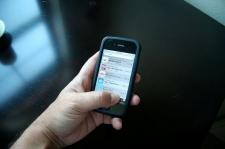How Your Health Data Lead A Not-So-Secret Life Online
By Angus Chen,
NPR
| 07. 30. 2016
Untitled Document
There are apps that can help people with diabetes keep track of their blood sugar and apps that can attach to a blood pressure cuff and store blood pressure information. I use an app called ZocDoc to schedule and manage doctor's appointments. Every time I see a therapist or a primary care doctor or dentist, the data get stored in my personal account.
But we leave behind other trails of health data, too, from apps and activities that are sometimes only tangentially health related. When I walk down the street, an app on my phone logs steps as it bounces against my thigh. When I swipe a loyalty card at the pharmacy, the over-the-counter medications that I buy become bits of data attached to my name. Medical information can be gleaned from all this and more, says Nathan Cortez, a professor of law at the Southern Methodist University Dedman School of Law.
Those data aren't always protected. A recent report from the Department of Health and Human Services showed that the vast majority of mobile health apps...
Related Articles
By Pete Shanks
| 02.27.2026
Last month, we published “The Shameful Legacy of Tuskegee” which focused on a proposed experiment in Guinea-Bissau. The study’s plan echoed the notorious Tuskegee disaster, withholding safe, effective vaccines against hepatitis B from some newborns while inoculating others. It was to be financed by the U.S. but performed by a controversial Danish team. That project provoked a multi-national outcry, leading to a remarkable response from the World Health Organization:
WHO has significant concerns regarding the study’s scientific...
By Jenn White, NPR | 02.26.2026
By Kiana Jackson and Shannon Stubblefield, New Disabled South | 02.09.2026
"MC0_8230" via Wikimedia Commons licensed under CC by 2.0
This report documents a deliberate assault on disabled people in the United States. Not an accident. Not a series of bureaucratic missteps. An assault that has been coordinated across agencies...
By Scott Solomon, The MIT Press Reader | 02.12.2026
Chris Mason is a man in a hurry.
“Sometimes walking from the subway to the lab takes too long, so I’ll start running,” he told me over breakfast at a bistro near his home in Brooklyn on a crisp...




